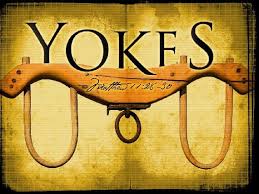 Come to Me, all you who labor and are heavy laden, and I will give you rest. Take My yoke upon you and learn from Me, for I am gentle and lowly in heart, and you will find rest for your souls. For My yoke is easy and My burden is light.
Come to Me, all you who labor and are heavy laden, and I will give you rest. Take My yoke upon you and learn from Me, for I am gentle and lowly in heart, and you will find rest for your souls. For My yoke is easy and My burden is light.
Matthew 11:28-30 (NKJV)
What was the audience’s reaction to Christ’s invitation to a yoking? The yoke was a figure of bondage and burden borne by slaves (Ex.5:5-7). Why would anyone want to wear it? The incentive to respond “positively” to Christ’s invitation is based on the following.
Who was the provider of the yoke? “Come unto Me.'” Christ was the Yoke. God the son was offering Himself to those who were hurting and in need of relief; relief from the hypocrisy and indifference of the religious institutions of that day and relief from social injustice and oppression by the Roman Empire. Christ came to offer justice and hope where none existed—a holy commission that could only be accomplished by the God of Creation (Jer. 32:17). Only He could fulfill that which He promised (2 Cor. 1:20).
What was the purpose of the yoke? “Take my yoke…Learn of Me.” These two actions—take and learn—highlight the role personal responsibility plays in acceptance of Christ’s invitation to salvation. The yoke of Christ represents His lordship over the life of the believer. Under His yoke, they would learn to live using “kingdom principles” (Col. 3:12-14) versus the ways of a fallen world. Believers could be fully confident that the Provider of the yoke would accomplish a purpose that would result in their good and God’s glory (Rom.8:28).
What was the privilege of the yoke? “Rest for your souls.” Christ alone, by His person and work, could accomplish two holy mandates. First, He could reconcile men to God (2 Cor. 5:18). The intimacy man once experienced with God in the Garden could now be restored at the foot of the Cross. Secondly, He could offer “rest” by the removal of sin’s guilt and the provision of eternal life (Rom. 6:23). Therefore, Christ’s yoke was “easy and light”.
Christ’s invitation to yoking is still being extended today. He is patiently waiting for nonbelievers to take His yoke and learn of Him. Believers, as “true yoke fellows” (Phil. 4:2-3) are to be likeminded in our efforts to share the Gospel at every opportunity (Matt. 28:19-20). The yoke of Christ offers both “blessing and burden” to those who would wear it. It is in its wearing that God gives the strength to receive both.
The word “stiff-necked” originated in ancient Israel. lf the oxen didn’t want to follow the guidance from the farmer, it would stiffen the muscles in its neck. This makes it impossible to guide the ox where it needed to go. Are you following the Spirit’s “lead” or are you “stiff-necked” like an oxen?

